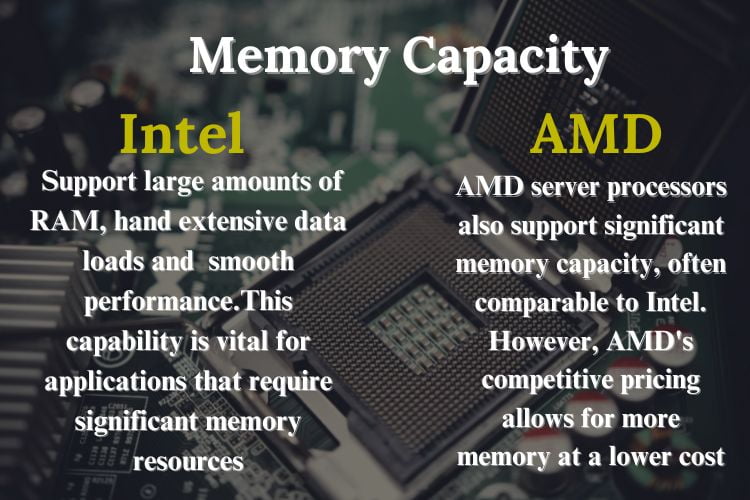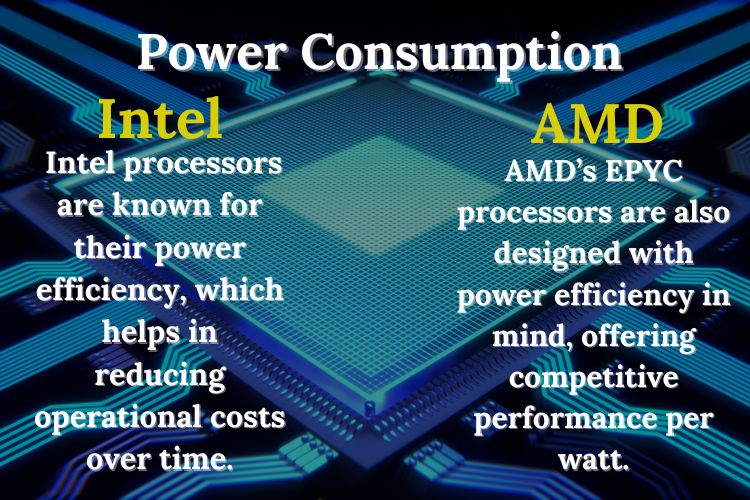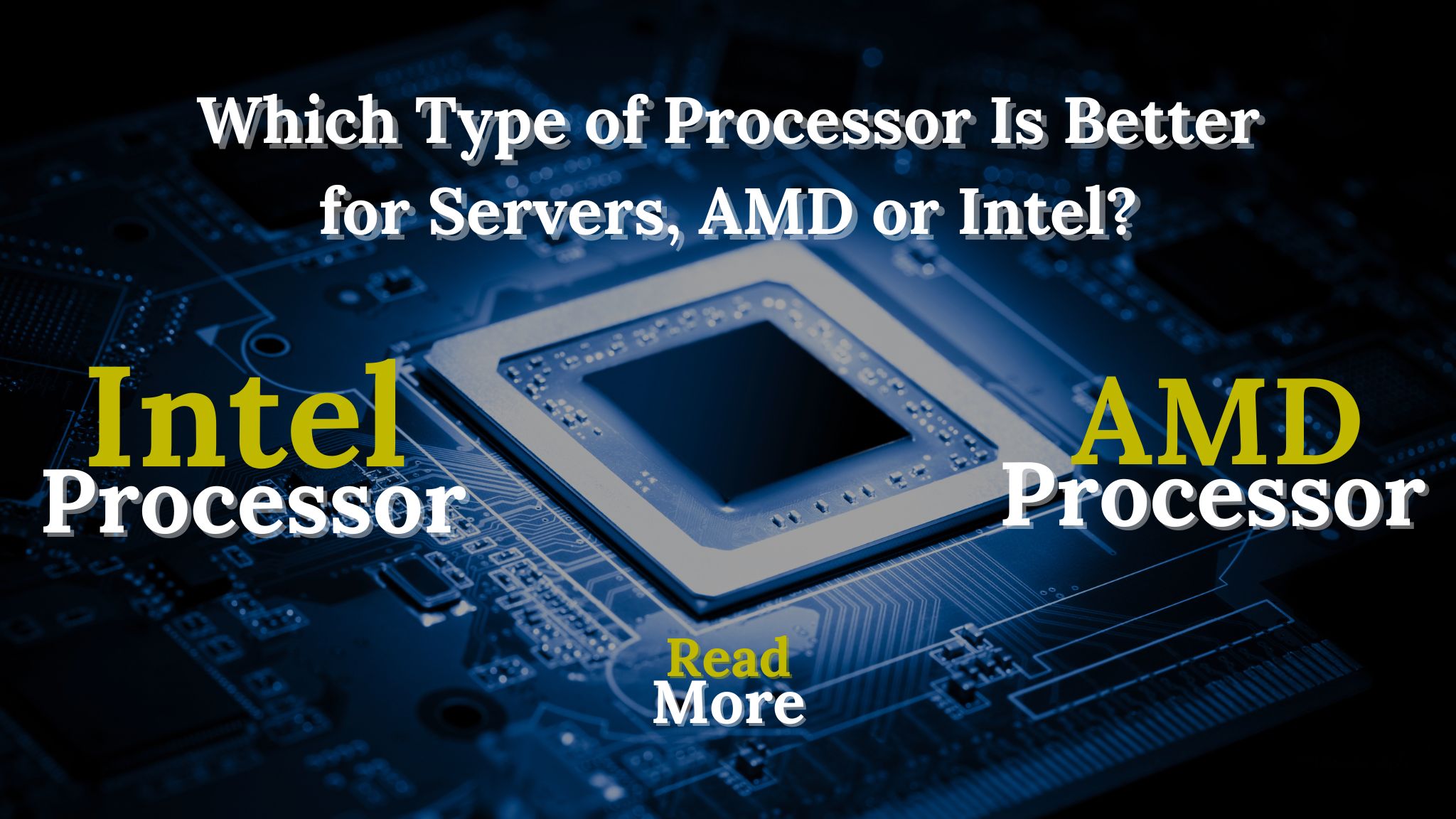Table of Contents
Choosing the right processor for your server is important for your business’s performance and efficiency. The two main players in the server CPU market are AMD and Intel Xeon. Each has its strengths and weaknesses, so let’s explore which type of processor is better for servers.
Processor Architecture
The architecture of a processor significantly influences its performance and capabilities. Both AMD and Intel have unique architecture for different needs, but Intel’s Xeon processors have long been the industry standard.
Performance
Performance is a critical factor when choosing a server processor. Intel’s Xeon processors are renowned for their exceptional performance and reliability, making them a popular choice in
Contact us
numerous data centers. They offer advanced features like Hyper-Threading and Turbo Boost, which enhance processing power and ensure smooth and efficient operation even under heavy workloads. These features allow Intel Xeon processors to handle complex computations and high-demand applications with ease.
AMD server processors, particularly the EPYC line, have made impressive strides in performance. They offer high core counts and large memory support, providing excellent performance at a more affordable price. However, Intel’s focus on single-core performance often gives it an edge in applications that require high-speed processing.
Core Count
Core count is another essential aspect to consider. Intel Xeon processors typically offer a range of core counts to suit different applications. They are designed to handle intensive tasks smoothly, providing robust performance across various workloads. Intel’s focus on balancing core count with individual core performance ensures that each core operates at optimal efficiency, making Xeon processors highly effective for both single-threaded and multi-threaded applications.
AMD’s EPYC processors usually provide higher core counts at a lower price point. This makes them Best for businesses needing powerful processors without breaking the bank. However, the integration and performance consistency of Intel Xeon cores often provide more stable and reliable performance for critical applications.
Memory Capacity

When it comes to memory capacity, Intel Xeon processors support large amounts of RAM, which is important for handling extensive data loads and ensuring smooth performance. This capability is vital for applications that require significant memory resources, such as large databases, virtual machines, and data analytics tasks. The ability to support high memory capacities makes Intel Xeon processors an excellent choice for businesses that need to manage and process large volumes of data efficiently.
AMD server processors also support significant memory capacity, often comparable to Intel. However, AMD’s competitive pricing allows for more memory at a lower cost, making it an attractive option for budget-conscious businesses.
Platform Support and Ecosystem
Platform support and ecosystem are vital considerations. Intel has a well-established ecosystem with broad support for various platforms and software. This extensive support network ensures compatibility and optimization for numerous applications, making it easier for businesses to integrate Intel Xeon processors into their existing infrastructure.
Intel’s long-standing relationships with software vendors and hardware manufacturers ensure that Xeon processors are optimized for a wide range of enterprise applications.
AMD has been catching up rapidly, with increasing platform support and a growing ecosystem. AMD’s EPYC processors are becoming more widely supported, providing a viable alternative to Intel’s dominance. However, Intel’s established ecosystem still offers a more seamless integration for many businesses.
Cost
Cost is a significant factor in decision-making. Intel Xeon processor prices can be higher, reflecting their advanced features and robust performance. Businesses with larger budgets might find Intel a suitable choice for its reliability and established reputation.
Investing in Intel Xeon processors can provide long-term value through consistent performance, reduced downtime, and lower total cost of ownership due to their reliability and efficiency.
AMD server processors offer a more affordable option without compromising too much on performance. This makes AMD EPYC processors an excellent choice for businesses looking to maximize their investment.
Security
Security features are important for server processors. Intel integrates various security measures into its Xeon processors, providing a secure environment for critical applications. Features such as Intel Software Guard Extensions (SGX) and Intel Trusted Execution Technology (TXT) help protect sensitive data and ensure that applications run in a secure, trusted environment.
These built-in security features make Intel Xeon processors a preferred choice for businesses that handle sensitive information and require robust security measures.
AMD’s EPYC processors prioritize security, while Intel’s advanced security technologies enhance data protection and confidence for enterprise users, alongside both Intel and AMD’s robust security features.
Heat Generation.
Heat generation can significantly impact the server’s performance and longevity. Intel processors are designed to manage heat effectively, maintaining performance under heavy loads. Their efficient thermal management helps prevent overheating and ensures that servers remain stable and reliable even during intensive tasks.
AMD processors are also efficient in heat management. However, their higher core counts can lead to increased heat generation, which requires adequate cooling solutions.
Power Consumption

Power consumption is another key aspect. Intel processors are known for their power efficiency, which helps in reducing operational costs over time. Intel’s focus on energy efficiency ensures that Xeon processors deliver high performance while consuming less power, making them Best for data centers and businesses looking to minimize their energy footprint.
AMD’s EPYC processors are also designed with power efficiency in mind, offering competitive performance per watt. Choosing between Intel and AMD might come down to the specific power needs of your server setup.
Intel vs. AMD: Which Server Processor Is Best for Your Business?
Deciding between Intel Xeon processors and AMD server processors ultimately depends on your specific business needs and budget. Intel Xeon processors are a reliable choice for those with a larger budget, offering robust performance, a comprehensive support ecosystem, and advanced security features.
Their exceptional performance, memory capacity, and platform support make them a preferred choice for many enterprise applications.
For businesses seeking high performance at a more affordable price, AMD EPYC processors provide excellent value. They offer high core counts, significant memory capacity, and competitive performance, making them a viable option for many applications.
However, the reliability, stability, and extensive support ecosystem of Intel Xeon processors often make them the preferred choice for mission-critical environments.
Serverstack provides reliable services for Intel Xeon and AMD EPYC processors, ensuring optimal performance and support for businesses. Partnering with them enhances server reliability.
If you have any query related processor and server. Directly contact our server experts.
Conclusion
Both Intel Xeon and AMD EPYC processors have their advantages. Intel offers unparalleled reliability, performance, and a comprehensive support ecosystem, making it the Best choice for businesses that prioritize stability and long-term value. AMD provides high core counts and affordability, making it a strong contender for cost-conscious businesses
Frequently Asked Questions
Intel Xeon processor is great for strong single-core performance and stability. AMD offers excellent multi-core performance and is more budget-friendly.
Intel Xeon processor excels in single-core performance and reliability. AMD is a more suitable choice for multi-core tasks due to its affordability.
Intel Xeon is best for critical applications. AMD EPYC is great for multi-core performance and budget-friendly solutions.







